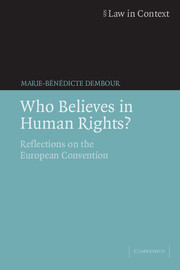Book contents
- Frontmatter
- Contents
- Acknowledgements
- Table of cases
- List of tables
- 1 Introduction
- 2 The Convention in outline
- 3 The Convention in a realist light
- 4 The Convention in a utilitarian light
- 5 The Convention in a Marxist light
- 6 The Convention in a particularist light
- 7 The Convention in a feminist light
- 8 The human rights creed in four schools
- 9 Conclusion: In praise of human rights nihilism
- Appendices
- Select Bibliography
- Index
1 - Introduction
Published online by Cambridge University Press: 03 February 2010
- Frontmatter
- Contents
- Acknowledgements
- Table of cases
- List of tables
- 1 Introduction
- 2 The Convention in outline
- 3 The Convention in a realist light
- 4 The Convention in a utilitarian light
- 5 The Convention in a Marxist light
- 6 The Convention in a particularist light
- 7 The Convention in a feminist light
- 8 The human rights creed in four schools
- 9 Conclusion: In praise of human rights nihilism
- Appendices
- Select Bibliography
- Index
Summary
This book grew out of my attraction to and discomfort with the idea of human rights. When I led an Amnesty International group as a law undergraduate twenty years ago, the concept of human rights already seemed to me both desirable (or even necessary) and flawed. Since then I have never been sure which of these two aspects take precedence. If I stress the defects of the concept I immediately want to recall that the concept is important and cannot be dismissed altogether. Conversely, I do not wish to signify my attachment to the concept without highlighting that it is far, very far, from being a panacea. This book represents my attempt to sort out my persistent ambivalence towards human rights. It does so by seeking to answer the following two questions: Can we believe in human rights? Should we believe in human rights? I shall give my personal answer to these questions. I shall also provide an intellectual map of the way I understand current scholarship approaches the concept of human rights.
Human rights as an article of faith
According to a standard definition, human rights are those rights one has by virtue of being human. This definition suggests that human rights belong to every human being in every human society: all human beings have them, equally and in equal measure. Implied in one's humanity, human rights are generally presented as being inalienable and imprescriptible – they cannot be transferred, forfeited, or waived.
- Type
- Chapter
- Information
- Who Believes in Human Rights?Reflections on the European Convention, pp. 1 - 18Publisher: Cambridge University PressPrint publication year: 2006

